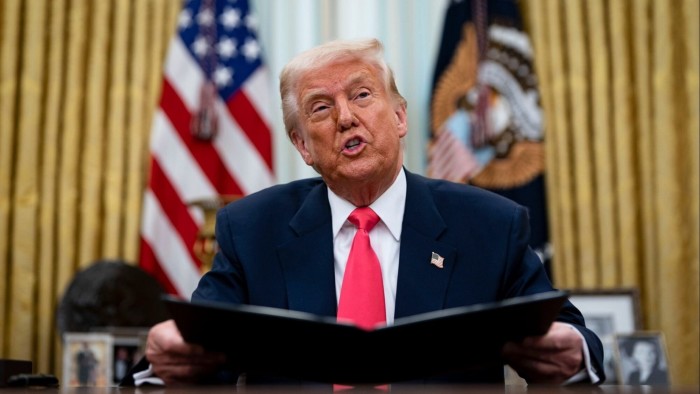Unlock the White House Watch newsletter for free
Your guide to what the 2024 US election means for Washington and the world
The writer is chief US economist at Brevan Howard
President Donald Trump’s administration argues reciprocal tariffs between the US and other nations can level the playing field for fair trade. But what is a fair rate?
For Europe, there is a clear case for taking action. Tariff rates between the US and Europe are relatively small but officials have correctly identified that Europe’s competitive advantage primarily owes to non-tariff barriers — especially how it applies value added tax.
A recent White House memo pointed out a lack of reciprocity was one source of the large and persistent US annual trade deficit in goods. It cited VAT as one of the unfair, discriminatory, or extraterritorial taxes imposed by trading partners that it wanted to tackle.
Essentially European companies such as carmakers do not pay VAT on goods for export. For the European Commission that is a fundamental principle. The problem for US companies exporting into Europe is that it puts them at a competitive disadvantage
Think of it this way. German carmaker BMW can sell into the high-tax European market or export into the lower-tax US market, taking advantage of the VAT rebate. By contrast, US maker General Motors must compete against BMW in Europe without an export subsidy. As BMW receives a VAT rebate when exporting outside Europe, it is in effect shielded from the tax burden borne domestically — an implicit subsidy GM does not enjoy when exporting Cadillacs to Europe.
Take a $100 good for example. European producers can sell it domestically at about $120 after VAT but export it free of the tax at $100. US exporters to European markets must compete against domestic companies, paying VAT locally while also bearing embedded domestic US taxes. That might be one reason there are a lot more BMWs sold in the US than Cadillacs in Europe.
It is a long-standing problem. As Gary Clyde Hufbauer of the Peterson Institute for International Economics has pointed out, after European countries adopted VAT in the 1960s, US firms argued that the rebate on exports and its imposition on imports disadvantaged American exporters. In 1971, the then Treasury under-secretary Paul Volcker helped introduce a new tax vehicle, the domestic international sales corporation or Disc, which reduced the corporate tax burden on exports by qualifying US firms.
“We have concluded that we can no longer afford the luxury of forcing our exporters over tax obstacles that their foreign competitors — sometimes, ironically enough, their own affiliated corporations overseas — do not have to run,” he said in a 1970 speech.
Hufbauer adds the Disc status was phased out in place of an alternative scheme agreed under negotiations for the General Agreement on Tariffs and Trade, only for the WTO’s dispute settling body to later rule it illegal. Part of the reason why the Trump Administration must resort to tariffs is because US efforts to promote trade through export subsidies has been repeatedly thwarted by the WTO. Some export-subsidy schemes still exist but the VAT issue has persisted since.
While Europeans might recommend a VAT in the US to equalise the tax treatment of Cadillacs and BMWs, Americans are unlikely to support adding to existing state and local sales taxes. Nevertheless, Trump has tariffs in his toolbox.
One might think a simple, reciprocal 20 per cent tariff would level the playing field. But that misses the important imbalance on taxes when thinking about US exports — a VAT is embedded in the final price consumers pay, whereas a tariff is added explicitly on top of the pre-tax price.
To neutralise the competitive disadvantage for its companies, the US must impose tariffs exceeding Europe’s VAT rate — my calculations suggest 25 per cent. This would create a price cushion that compensates US exporters for the embedded domestic taxes they bear. This higher tariff does not unfairly penalise Europe; it merely neutralises Europe’s implicit export subsidy.
Trump has identified a genuine imbalance in trade with Europe that has vexed US policymakers for decades. Although he may not hold a PhD in economics, his economic advisers like National Economic Council director Kevin Hassett and Council of Economic Advisers chair Stephen Miran do. Their advice will translate Trump’s instinct for fairness into practical trade policy.
A potential US tariff of 25 per cent on goods from Europe is not arbitrary, punitive, or merely a negotiating tactic. It logically addresses inherent differences between tariff and VAT systems. From an economic perspective, it’s only fair.

